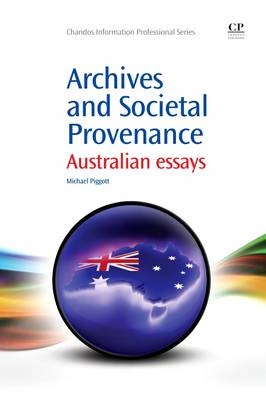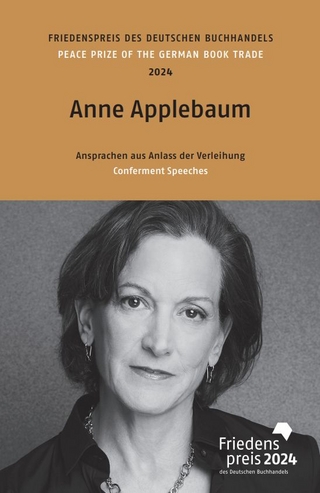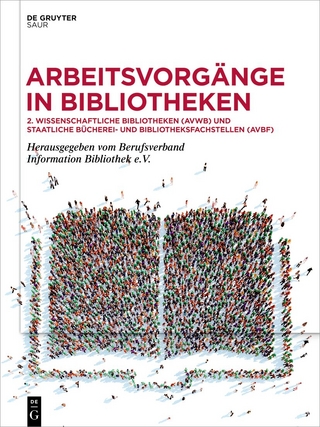
Archives and Societal Provenance
Chandos Publishing (Oxford) Ltd (Verlag)
978-1-84334-712-5 (ISBN)
- Titel ist leider vergriffen;
keine Neuauflage - Artikel merken
Records and archival arrangements in Australia are globally relevant because Australia’s indigenous people represent the oldest living culture in the world, and because modern Australia is an ex-colonial society now heavily multicultural in outlook. Archives and Societal Provenance explores this distinctiveness using the theoretical concept of societal provenance as propounded by Canadian archival scholars led by Dr Tom Nesmith. The book’s seventeen essays blend new writing and re-workings of earlier work, comprising the fi rst text to apply a societal provenance perspective to a national setting.After a prologue by Professor Michael Moss entitled A prologue to the afterlife, this title consists of four sections. The first considers historical themes in Australian recordkeeping. The second covers some of the institutions which make the Australian archival story distinctive, such as the Australian War Memorial and prime ministerial libraries. The third discusses the formation of archives. The fourth and final part explores debates surrounding archives in Australia. The book concludes by considering the notion of an archival afterlife.
Michael Piggott is a consultant and independent scholar. He is a former Australian archivist with 37 years of experience as an archival practitioner and manager. His career included appointments at the National Library of Australia, the Australian War Memorial, the National Archives of Australia and the University of Melbourne. He has been active in the Australian Society of Archivists since its inception in 1975 and has produced scholarly guides to collections, and published widely on archival history and education, including personal papers and diaries. His latest refereed work was an invited paper for the inaugural issue of Grainger Studies: An interdisciplinary journal. In 2010 he was invited to become an Honorary Associate of the National Museum of Australia's Centre for Historical Research, and an Honorary Member of the Centre for Organisational and Social Informatics, Monash University.
A prologue to the afterlife
Acknowledgements
About the author
Chapter 1: Introduction: societal provenance
Abstract.
Terroir, culture and the individual
The aura of societal provenance
Australia and the Australian people
Other terminology
Applying societal provenance
Part 1: History
Chapter 2: Themes in Australian recordkeeping, 1788–2010
Abstract.
British recordkeeping legacy
The governing machinery
Immigrant nation
The ordinary Australian: free immigrants and soldiers
Conclusion
Chapter 3: Schellenberg in Australia: meaning and precedent
Abstract.
Assessing Schellenberg’s visit
Impact on the Paton Inquiry, and on Schellenberg
Political use
Cultural cringe
Impact of later visitors
Chapter 4: Archives: an indispensable resource for Australian historians?
Abstract.
The three-stage discovery model
Just how important are archives?
The Australian archives-history nexus
In summary
Chapter 5: The file on H
Abstract.
Part 2: Institutions
Chapter 6: Libraries and archives: from subordination to partnership
Abstract.
The setting – the 1950s
Schellenberg and the Paton Inquiry
Librarians’ guest, archivists’ hope
National Library Inquiry Committee
Inquiry membership
The inquiry supports separation
The arguments
Other later developments
Chapter 7: Making sense of prime ministerial libraries
Abstract.
Meanings
Benefits
Challenges
Conclusion
Chapter 8: War, sacred archiving and C.E.W.Bean
Abstract.
The setting
Archives
What it all meant
Part 3: Formation
Chapter 9: Saving the statistics, destroying the census
Abstract.
Conducting the census
Confidentiality
The current debate
Supporting destruction
The case for retention
Claim and counter-claim
The independent inquiry
Reflections
Chapter 10: Documenting Australian business: invisible hand or centrally planned?
Abstract
Handicaps and solutions
Conditioning factors
Chapter 11: Appraisal "firsts" in twenty-first-century Australia
Abstract.
Trust and Technology
Appraising census forms
Business archives
Australian Society of Archivists
In summary
Part 4: Debates
Chapter 12: Two cheers for the records continuum
Abstract.
The early to mid-1990s
Monash University
Frank Upward
The Australian audience
Abstractions, words and diagrams
Accolades and assessments
The inevitable limits of continuum theory
Chapter 13: Recordkeeping and recordari: listening to Percy Grainger
Abstract:
Percy Grainger
Rose Grainger
The recordkeeper
Finding an archives host
A convenient form of artificial memory
The Remembrancer
Rich archive, wretched memory
Memory-dependent recordkeeping
Chapter 14: Alchemist magpies? Collecting archivists and their critics
Abstract.
Historian friends
Sir Hilary Jenkinson
Chris Hurley
Richard Cox
A partial rejoinder
The collecting archivist
The results of collecting: it hardly matters
The results of collecting: it matters
Chapter 15: The poverty of Australia's recordkeeping history
Abstract.
Acquisition
Destruction
Problems with traditional history
Criticism 1: it starts only in 1788
Criticism 2: a dated notion of what archives are and what archivists do
Criticism 3: the neglect of recordkeeping systems history
Criticism 4: the absence of a history of the record
Conclusion
Chapter 16: Acknowledging Indigenous recordkeeping
Abstract.
Definitions
The need for new definitions
Tanderrum
Message sticks
Cognitive records, Dreaming archives
Towards an inclusive Australian archival science
Epilogue: an archival afterlife
Reference
Index
| Reihe/Serie | Chandos Information Professional Series |
|---|---|
| Verlagsort | Witney |
| Sprache | englisch |
| Maße | 156 x 234 mm |
| Gewicht | 630 g |
| Themenwelt | Sozialwissenschaften ► Kommunikation / Medien ► Buchhandel / Bibliothekswesen |
| ISBN-10 | 1-84334-712-1 / 1843347121 |
| ISBN-13 | 978-1-84334-712-5 / 9781843347125 |
| Zustand | Neuware |
| Haben Sie eine Frage zum Produkt? |
aus dem Bereich


